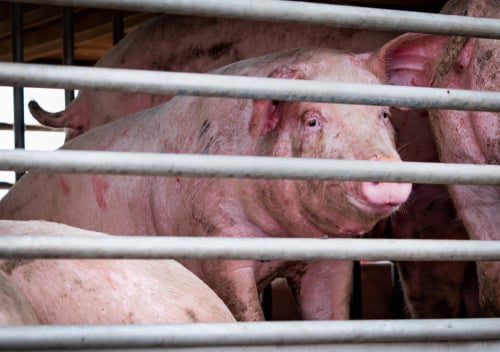Jackson joins 3 conservative dissenters as Supreme Court upholds California’s pig welfare law

Image from Shutterstock.
The U.S. Supreme Court on Thursday upheld a California law that bans the in-state sale of pork that comes from pigs raised in tiny stalls.
The Supreme Court rejected a challenge to the law by the National Pork Producers Council and the American Farm Bureau Federation, which sued on behalf of their pork-producing members. Justice Neil Gorsuch wrote the May 11 controlling opinion.
Chief Justice John Roberts wrote a partial dissent, joined by Justices Ketanji Brown Jackson, Brett Kavanaugh and Samuel Alito. The dissenters would have allowed the pork producers to continue to press one of their commerce clause claims on remand that was based on a 1970 Supreme Court decision, Pike v. Bruce Church Inc.
The California law, known as Proposition 12, was adopted by a ballot referendum approved by about 63% of the people who voted. It bans the California sale of whole pork meat derived from breeding pigs that are held in crates so small that they can’t stand up, lie down or turn around.
The challengers had argued that the law interfered with their preferred way of doing business in violation of the dormant commerce clause, which bans state laws intended to benefit in-state economic interests by burdening out-of-state competitors.
The pork producers conceded that California’s law was not intended to advantage in-state companies at the disadvantage of out-of-state rivals. Instead, they pressed two arguments.
The first was that the commerce clause forbids enforcement of state laws that have the effect of controlling commerce outside the state. The second was that the commerce clause forbids enforcement of state laws that impose excessive burdens relative to the benefit, an argument based on the Pike decision.
Gorsuch said the pork producers’ arguments invited the Supreme Court “to fashion two new and more aggressive constitutional restrictions on the ability of states to regulate goods sold within their borders.”
“We decline that invitation,” Gorsuch wrote. “While the Constitution addresses many weighty issues, the type of pork chops California merchants may sell is not on that list.”
A section of Gorsuch’s opinion on why the pork producers failed in their Pike excessive-burdens argument did not garner a majority. A concurring opinion by Justice Sonia Sotomayor, joined by Justice Elena Kagan, said they thought that the claim failed because the pork producers failed to plausibly allege an excessive burden on interstate commerce under Pike.
In a separate dissent, Kavanaugh explained that he and the other partial dissenters, combined with Sotomayor and Kagan, provided six votes to uphold the Pike balancing test. But a controlling four-justice plurality section of Gorsuch’s opinion—which included Sotomayor, Kagan and Justice Clarence Thomas—applied Pike and rejected the commerce clause challenge, Kavanaugh said.
Hat tip to SCOTUSblog and Steve Vladeck, a professor at the University of Texas School of Law, via @Steve_Vladeck on Twitter.
See also:
ABAJournal.com: “SCOTUS will consider whether California pork law may violate dormant commerce clause”
Write a letter to the editor, share a story tip or update, or report an error.



